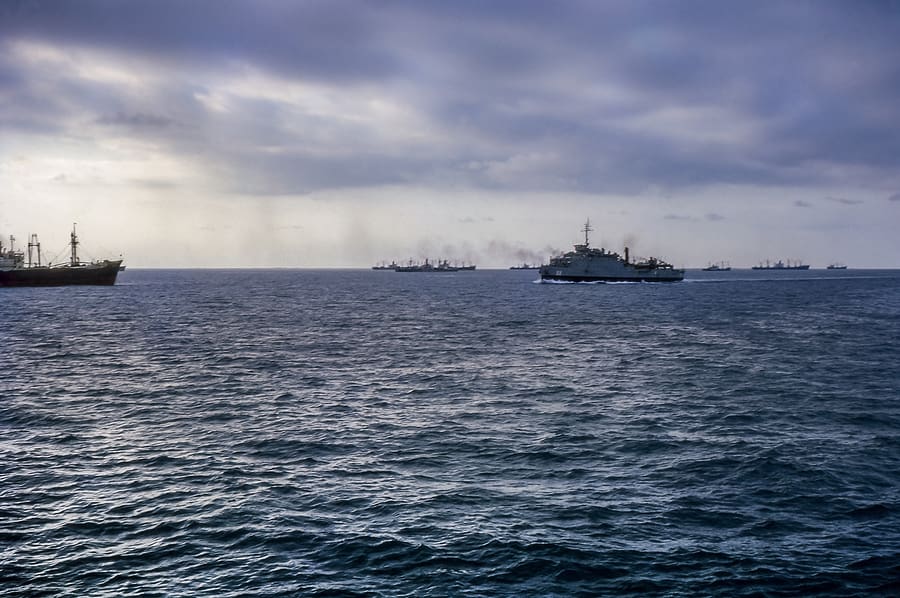
Are You a Veteran & Exposed in a Blue Water Zone?
Navy veterans who believe they were exposed to toxic herbicides in Blue Water Zones can review their records, engage an attorney, and speak with the VA to determine if they qualify for disability benefits.
Summary
- Veterans exposed to Agent Orange in Blue Water Zones while serving on military vessels during the Vietnam War can seek VA disability benefits.
- Determining exposure in a Blue Water Zone can be challenging, but veterans can review their records and consult with the VA and attorneys for assistance.
- Blue Water Zones were areas contaminated by herbicides like Agent Orange during the Vietnam War, endangering American troops.
- Veterans with health issues from Agent Orange exposure may qualify for VA disability benefits.
- Consulting with a VA-accredited veterans appeals claims lawyer can help veterans navigate the claims process.
Navigating Blue Water Zone Claims: Expert Legal Support for Veterans
Veterans of the Vietnam War may have been exposed to Agent Orange in a Blue Water Zone (BWZ) while aboard a military vessel. Those who also suffer from one of the presumptive conditions associated with serving in a BWZ are likely eligible to seek VA disability benefits.
However, it can be difficult to find out if you were exposed in a Blue Water Zone. Our team at VetLaw can help you collect evidence so the VA can confirm you are entitled to receive benefits. Our Navy VA benefits lawyers have a long-standing reputation for providing diligent legal service to veterans in crisis.
Keep in mind that the official Blue Water Zones now include both inland and offshore waters. If the VA previously denied your claim, you should speak with us about how to file an appeal.
Our dedicated veterans disability claims attorneys are prepared to go to work for you. Set up a free case evaluation with us by calling (855) 500-4672 or completing a contact form today.
What is a Blue Water Zone?
A “Blue Water Zone” is a term the VA uses to refer to areas that were likely contaminated by dangerous weed killers during the Vietnam War. The U.S. turned to now-infamous herbicides like Agent Orange to decimate tree cover and food supplies that sustained the Vietnamese fighters.
However, many American troops in BWZs were exposed in the process. As Navy and Coast Guard ships traveled through the Blue Water Zones, they were at risk of inhaling Agent Orange. Vets were also exposed through tainted drinking water and contact with surfaces coated in Agent Orange.
American military vessels would also navigate inland and dock in Vietnamese waters. This put personnel in closer proximity to the weed killer that researchers later linked to many adverse health effects. Congress and the VA have established specific geographic parameters to define the Blue Water Zone so benefits can be awarded.
How Vets Can Determine if They Were Exposed in a Blue Water Zone
It can be difficult to remember details of events from decades ago under ideal circumstances, let alone during wartime deployments. Check to see if you meet the basic criteria for a Blue Water Veteran, and if you have trouble confirming the specifics, get in touch with the VA and a veterans disability claims lawyer.
Qualifications for Blue Water Veterans
If all of the following conditions apply to you, you may have grounds for a VA disability benefits claim based on exposure in a Blue Water Zone:
- You served in the military on a Navy or Coast Guard ship between January 9th, 1962, and May 7th, 1975
- The military vessel you were serving on operated within 12 nautical miles of Vietnamese or Cambodian waters
- You have a medical issue that is one of the VA’s 14 presumptive conditions for Agent Orange exposure
Service records can help determine if your ship was located within the Blue Water Zone. When you file your veterans disability benefits claim with the VA, your service records can be compared to the ship’s history and deck logs to validate your case.
Additionally, your medical records can confirm you were diagnosed with one of the presumptive conditions for Agent Orange exposure. It’s a good idea to apply to the Agent Orange registry, as this status supports your VA disability benefits claim.
Speak With a Navy VA Benefits Lawyer About Filing an Agent Orange Disability Claim
Over the last few years, there has been a renewed focus on ensuring veterans who were exposed to toxic chemicals while serving in the military are granted VA disability benefits for their resulting injuries and illnesses. The Blue Water Navy Vietnam Veterans Act, along with the reforms instituted by the PACT Act, has helped accomplish this goal.
Now, our team of experienced veterans disability appeals attorneys is ready to help Vietnam vets who were exposed in a Blue Water Zone take advantage of this progress. We have a long history of successfully representing veterans with service-related conditions in Agent Orange claims. Our team is prepared to do the same for you.
We recommend scheduling a consultation if you have questions concerning VA benefits after being exposed in a Blue Water Zone. Give us a call at (855) 500-4672 or fill out a contact form today.
Our team of veterans disability benefits denial lawyers is happy to assist you with your Agent Orange VA claim. We look forward to discussing your legal options in a free consultation.
Frequently Asked Questions
Does the Blue Water Navy Vietnam Veterans Act only provide VA disability benefits to Navy veterans?
No, veterans from any branch can apply for VA disability benefits if they were exposed in a Blue Water Zone. They still have to meet the rest of the VA’s standard requirements.
How many military veterans are at risk of health problems from Agent Orange after being exposed in a Blue Water Zone?
An estimated 3 million American military personnel served in Vietnam when the U.S. was actively spraying Agent Orange. Many of those individuals likely came into contact with the toxic substance, but levels of exposure varied.
What makes Agent Orange so dangerous?
Agent Orange was a major health hazard. There are several factors that made it a serious threat. The following are a few reasons why Agent Orange posed such a risk to military service members in Blue Water Zones and on land:
- It contains a chemical called dioxin, which can cause veterans to develop cancer and other life-threatening conditions.
- Agent Orange is easy to absorb accidentally and difficult to avoid if you are in a contaminated area.
- The concentration of Agent Orange was high because the U.S. military sprayed large volumes of it, creating unsafe exposure levels.
- The effects of Agent Orange are not limited to the individual who had direct exposure. Children of veterans with Agent Orange exposure can suffer from congenital disorders.



